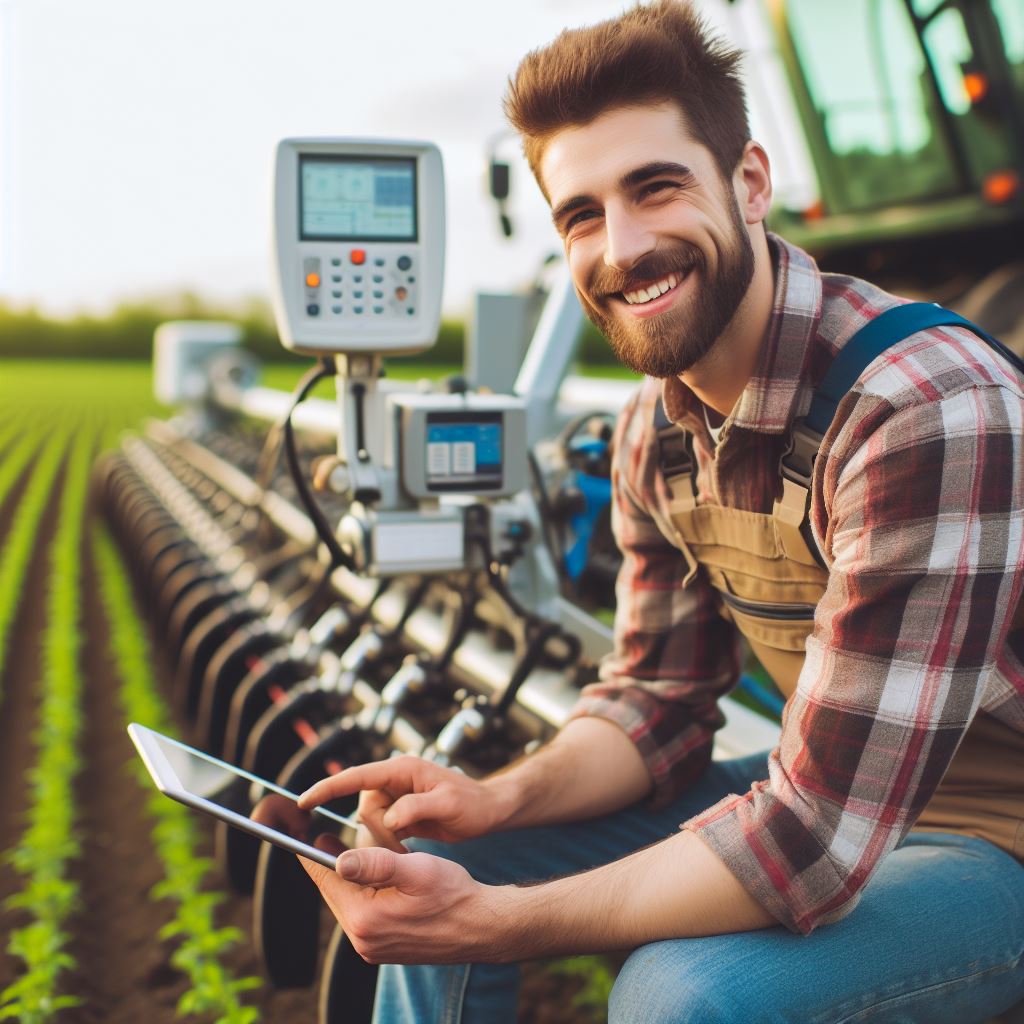Introduction
As we explore “Young Farmer Tech Meets Soil” we delve into the transformative journey of agriculture through the lens of a young farmer.
In today’s dynamic farming landscape, technology is not just a tool but a game-changer. Young farmers, armed with ambition and innovation, are steering agriculture into a tech-driven future.
Embracing a spectrum of advancements, from precision farming to AI applications, these tech-savvy individuals redefine the traditional narrative of agriculture.
Their fresh perspective doesn’t view technology as a disruption but as a catalyst for growth.
From automated machinery to drone-assisted crop monitoring, young farmers harness the power of innovation to enhance efficiency.
Fields, once plowed by hand, are now navigated by autonomous tractors guided by GPS precision.
Data is the new currency in farming, and these young minds are fluent in its language.
They analyze weather patterns, predict optimal planting times, and fine-tune irrigation with a precision that maximizes yields and minimizes resource wastage.
Robotics steps in where manual labor was once the norm.
Seeding, weeding, and harvesting are no longer exhaustive tasks; they are seamlessly executed by smart machines under the watchful eye of these forward-thinking farmers.
We witness firsthand how technology, far from being a disruptor, emerges as the driving force behind a sustainable and progressive farming future.
The story of a young farmer
The protagonist and their background as a young farmer
Meet John, a young farmer hailing from a small town in the heartland of America.
Growing up, John was surrounded by vast open fields and the rich aroma of freshly tilled soil. From an early age, he always felt a deep connection to the land.
As a child, John would spend his summers helping his grandparents on their farm, learning the art of cultivating crops and raising livestock.
He would eagerly wake up before dawn, excited for another day spent in the fields, a dusty hat placed firmly on his head and a pair of worn-out boots on his feet.
Transform Your Agribusiness
Unlock your farm's potential with expert advice tailored to your needs. Get actionable steps that drive real results.
Get StartedTheir passion for farming and their journey so far
John’s passion for farming only grew stronger with time.
After graduating high school, John pursued agricultural studies to deepen his farming knowledge. At college, he learned sustainable practices.
Armed with ambition, John returned home, eager to apply his newfound expertise to his family’s land.
Through hard work, he transformed it into a flourishing farm, experimenting with various crops and overcoming challenges.
John, not content with traditional methods, sought innovative technologies. He discovered a startup merging tech and agriculture, testing their soil monitoring system.
It provided real-time data on moisture, nutrients, and pH balance, optimizing crop yield.
With this technology, John’s farm thrived. He reduced water and fertilizer usage, promoting sustainability. His success attracted fellow farmers seeking advice, inspiring them to embrace technology.
Today, John farms with passion and innovation, believing in a harmonious blend of technology and tradition. His journey, though challenging, reaffirms his dedication to farming as a way of life.
John’s story serves as a reminder that young farmers like him have the power to shape the future of agriculture.
With their passion, resilience, and embrace of technology, they are laying the foundation for a sustainable and prosperous farming industry.
Read: From Plows to iPads: A Farmer’s Tech Leap
The Impact of Technology in Agriculture
Technologies being used in modern farming
In today’s modern farming practices, various technologies have been embraced, revolutionizing the agricultural industry.
Precision Agriculture
- Precision farming employs GPS and satellite imagery for the precise application of fertilizers and pesticides.
- This technology enables farmers to optimize inputs, minimizing waste and maintaining soil health.
- By mapping soil variability, farmers can adopt site-specific management practices for better crop yields.
Drones in Farming
- Drones equipped with cameras and sensors provide valuable insights on crop health and irrigation needs.
- These aerial devices help monitor crop conditions, detect diseases, and identify areas requiring attention.
- Efficiently surveying large areas, drones save time and resources while improving productivity and accurate decision-making.
Crop Sensors
- Crop sensors detect vital plant information such as nutrient deficiency, enabling targeted fertilization.
- They collect data on chlorophyll levels, canopy temperature, and moisture content, allowing precise nutrient application.
- By preventing over-application, crop sensors reduce environmental impact while optimizing crop yield.
Internet of Things (IoT) in Agriculture
- IoT devices, like sensors and actuators, automate farming processes, enhancing efficiency and productivity.
- These devices gather real-time data on temperature, humidity, and soil moisture, and remotely control irrigation systems.
- By enabling continuous monitoring and automated responses, IoT maximizes resource utilization and reduces human error.
Agricultural Robots
- Robots perform tedious tasks like planting, weeding, and harvesting with accuracy, speed, and precision.
- These machines reduce labor costs, increase productivity, and minimize crop damage through gentle handling.
- With advanced machine learning capabilities, robots can adapt to various crops and environmental conditions.
How technology has benefited productivity and efficiency
The revolutionized agricultural industry owes many benefits to technology, including:
- Improved Productivity: Farmers benefit from tech advancements, achieving higher productivity by producing more crops efficiently with reduced time and resources.
- Enhanced Efficiency: Modern farming technologies have streamlined processes, reducing manual labor and increasing overall efficiency in executing tasks.
- Precise Resource Utilization: Tech tools offer precise data for optimizing water, fertilizer, and pesticide use, minimizing waste and environmental impact for farmers.
- Greater Sustainability: By adopting technology, farmers can implement sustainable practices, preserve soil health, reduce chemical usage, and conserve natural resources.
- Optimized Decision-Making: The availability of real-time data empowers farmers to make informed decisions promptly, leading to better crop management and increased profitability.
The integration of technology into agriculture has drastically transformed the industry.
Precision agriculture, drones, crop sensors, IoT, and agricultural robots have all played a significant role in improving productivity, efficiency, and sustainability.
As technology continues to advance, the future of farming holds even more exciting possibilities.
Read: Precision Agriculture: My Farm’s Success Story
Challenges faced by young farmers
Specific challenges young farmers face in adopting technology
Young farmers face specific challenges when it comes to adopting technology on their farms. These challenges include:
Lack of familiarity and training with advanced tools
Many young farmers may not have grown up using advanced technology, so they may lack the familiarity and training needed to effectively adopt and utilize these tools on their farms.
Financial constraints in investing in expensive technology
Technology can be expensive, and young farmers often face financial constraints that make it difficult for them to invest in the latest and most advanced tools.
Limited access to capital can hinder their ability to adopt technology.
Resistance to change traditional farming practices
Sometimes, young farmers face resistance from older generations who may be reluctant to embrace new technology.
This can create tension and make it more challenging for young farmers to adopt and incorporate technology into their farming practices.
Limited access to information and education
Young farmers may face difficulties in accessing information and education about the latest advancements in agricultural technology.
Showcase Your Farming Business
Publish your professional farming services profile on our blog for a one-time fee of $200 and reach a dedicated audience of farmers and agribusiness owners.
Publish Your ProfileThis lack of knowledge can hinder their ability to effectively adopt and leverage technology on their farms.
Interoperability and compatibility issues
The compatibility of different technologies can be a challenge for young farmers.
Integrating various tools and systems seamlessly can be complex and require technical expertise that may not be readily available to young farmers.
Lack of infrastructure and connectivity in rural areas
In rural areas, young farmers often face limited infrastructure and connectivity, which can hamper their ability to fully utilize technology.
Poor internet connectivity and inadequate infrastructure can limit their access to online resources and tools.
Reliability and maintenance concerns
Advanced agricultural technology requires regular maintenance, and young farmers may lack the knowledge or resources to address technical issues.
Concerns about the reliability of technology may discourage them from fully embracing it.
Risk of dependency on technology
- Young farmers may worry about becoming overly reliant on technology and losing touch with traditional farming practices.
- Balancing the adoption of technology with preserving traditional wisdom can be a challenge.
These challenges highlight the need for support systems and resources to assist young farmers in adopting and utilizing technology.
Training programs, financial assistance, mentorship opportunities, and improved infrastructure can all help alleviate these challenges and empower young farmers to leverage technology effectively.
Read: Family Farming: Balancing Tradition, Change
The Young Farmer’s Approach to Incorporating Technology
To thrive in an ever-evolving industry, the young farmer in our story has developed key strategies to embrace technology on their farm.
By adopting innovative practices, collaborating with more experienced farmers, seeking assistance from industry experts, and utilizing available resources and grants, they have managed to stay ahead in the game.
Embracing Technology on the Farm
- The young farmer recognizes the importance of technology and its potential to revolutionize the agricultural sector.
- They actively invest in state-of-the-art equipment and machinery that can streamline farming operations.
- By doing so, they maximize efficiency, reduce manual labor, and increase overall productivity on their farm.
- Additionally, the young farmer stays updated on the latest agricultural software and applications available in the market.
- They research and experiment with different software tools to determine which ones suit their specific needs the best.
- This proactive approach allows them to integrate technology seamlessly into their day-to-day operations.
Collaboration with Experienced Farmers
- The young farmer understands the value of learning from those who have been in the industry for longer.
- They actively seek out more experienced farmers and collaborate with them to gain insights and knowledge.
- Through mentorships and partnerships, the young farmer can exchange ideas and learn about successful technology implementation.
- They also share their own experiences, contributing to a collective learning environment that benefits everyone involved.
Seeking Assistance from Industry Experts
- Aware of the complexities surrounding technology integration, the young farmer isn’t afraid to ask for help.
- They reach out to industry experts, such as agricultural consultants or technology specialists, for guidance.
- These experts provide valuable advice on selecting the right technologies and implementing them effectively.
- By leveraging their expertise, the young farmer can avoid potential pitfalls and navigate the technological landscape more confidently.
Utilizing Available Resources and Grants
- The young farmer understands the financial constraints associated with incorporating technology on the farm.
- To overcome these barriers, they actively seek out available resources and grants.
- Government programs or agricultural organizations often offer financial assistance specifically for technology adoption.
- The young farmer meticulously researches and applies for these grants, leveraging them to invest in cutting-edge technologies.
- They also make use of online resources and educational platforms that provide valuable information and support.
By combining these strategies, the young farmer successfully embraces technology on their farm, achieving significant advancements in productivity, sustainability, and competitiveness.
Through their continuous effort to stay at the forefront of technology, they serve as a shining example for the next generation of farmers.
Stay tuned for the next section, where we will delve into the impact of technology on soil health and environmental sustainability.
Read: Young Farmers, Big Dreams: Their Stories

Successes and Advancements
Implementing technology in farming has brought about numerous successes and advancements for the young farmer. Let’s take a closer look at some of these achievements:
Improved Yield
- The young farmer has witnessed a significant increase in yield since incorporating technology into their farming practices.
- Using precision agriculture techniques, such as GPS-guided equipment and drone monitoring, has allowed for more efficient use of resources.
- Real-time data analysis enables the farmer to make informed decisions regarding irrigation, fertilization, and pest control, resulting in higher crop yields.
Enhanced Quality
- Through the adoption of innovative technology, the young farmer has been able to enhance the quality of their produce.
- Automated sorting and grading systems ensure that only the best fruits and vegetables reach the market.
- Utilizing IoT devices to monitor soil conditions and weather patterns has helped optimize nutrient composition, leading to superior crop quality.
Sustainable Farming Practices
- The young farmer has embraced sustainable farming practices with the help of technological advancements.
- By leveraging precision agriculture tools, they have reduced the use of water, fertilizers, and pesticides, minimizing the environmental impact.
- Remote sensing technologies have allowed them to detect early signs of crop diseases and take preventive measures, reducing the need for chemical treatments.
Positive Impact on Profitability
- Integrating technology into their farming operations has had a positive impact on the profitability of the young farmer.
- Higher yield and improved crop quality have translated into increased revenue for the farm.
- By optimizing resource utilization and minimizing waste, the farmer has also been able to reduce production costs, further boosting their profitability.
The young farmer’s journey is a testament to the transformative power of technology in agriculture.
Through their achievements and advancements, they serve as an inspiration for others in the industry to embrace innovation and drive positive change.
Future prospects for tech-savvy farmers
As technology continues to advance at a rapid pace, the potential for its application in the field of farming is vast.
Tech-savvy farmers are well-positioned to shape the future of agriculture through the use of cutting-edge technology, resulting in increased efficiency, productivity, and sustainability.
Advancements in precision agriculture
Precision agriculture involves the use of technology to enable farmers to optimize their use of resources such as water, fertilizers, and pesticides.
Through the use of sensors, drones, and GPS technology, farmers can gather data about their fields and make informed decisions about crop management.
For instance, by using satellite imagery and data analytics, farmers can precisely identify areas of their fields that require more or less irrigation, reducing water waste.
Similarly, sensors can provide real-time information about soil fertility, allowing farmers to apply fertilizers only where necessary, minimizing environmental impact.
Automation in farming
The future of farming lies in automation, where machines equipped with artificial intelligence and robotics take over repetitive tasks, freeing up farmers’ time and reducing labor costs.
This enables farmers to focus on more complex decision-making processes and allows for better monitoring of crops.
Robotic platforms can perform tasks such as planting, harvesting, and even weeding with precision and efficiency.
Autonomous vehicles and drones can be used for spraying pesticides, saving farmers from exposure to harmful chemicals and reducing chemical usage overall.
Harnessing the power of data analytics
Big data analytics have the potential to revolutionize farming by providing valuable insights into crop health, weather patterns, and market trends.
By collecting and analyzing large volumes of data, farmers can make data-driven decisions to optimize yields and reduce waste.
For example, predictive analytics can help farmers anticipate pests and diseases, allowing for early intervention to prevent potential crop losses.
Market data can also assist farmers in making informed choices about which crops to grow, based on demand and profitability.
Opportunities for young farmers
- With the rapid evolution of agricultural technology, there are immense opportunities for young farmers to embrace and lead the way in implementing these advancements.
- Young farmers, adept at using technology, can leverage their knowledge and skills to make farming more sustainable and profitable.
- By adopting tech-enabled farming practices, young farmers can attract investment and support from various stakeholders, including venture capitalists and governmental organizations.
- The integration of technology also makes farming more appealing to a new generation of farmers who are passionate about sustainability and innovation.
- In addition, technology offers young farmers the opportunity to connect with like-minded individuals through online platforms and communities.
- This facilitates collaboration and knowledge-sharing, enabling them to stay updated with the latest advancements and best practices in the industry.
In short, the future of farming lies in the hands of tech-savvy farmers who embrace and utilize advancements in precision agriculture, automation, and data analytics.
These technologies have the potential to revolutionize agriculture, leading to increased efficiency, sustainability, and profitability.
As opportunities abound, young farmers are well-positioned to lead the way and shape the future of farming for generations to come.
Conclusion
The young farmer’s journey has showcased the significance of technology in their story.
By embracing technology, they have been able to overcome challenges and improve their farming practices.
Other young farmers should consider adopting technology to enhance their farming methods.
With the help of technology, the future of farming looks promising and filled with opportunities for growth and sustainability.
Showcase Your Farming Business
Publish your professional farming services profile on our blog for a one-time fee of $200 and reach a dedicated audience of farmers and agribusiness owners.
Publish Your ProfileLet us embrace technology and pave the way for a brighter and more efficient future in farming.




